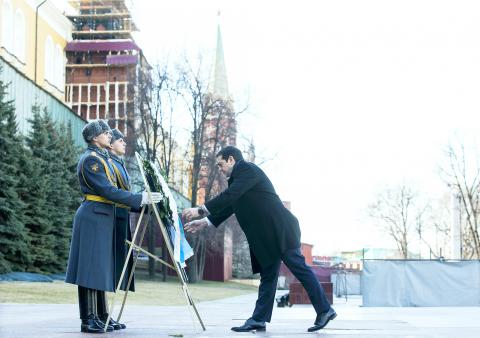Greek Prime Minister Alexis Tsipras was to meet Russian President Vladimir Putin in Moscow yesterday as part of an eye-catching visit that has fueled EU fears that cash-strapped Athens is cosying up to Russia.
The two-day trip comes as Tsipras is battling to unblock a rescue package from the EU and IMF, with some in Brussels warning against any move to barter financial support from Moscow for political backing over the Ukraine crisis.
However, analysts say that while the visit might see Moscow lift an embargo on Greek fruit, overall it is more about political grandstanding aimed at pressuring Europe, rather than a serious shift in policy.

Photo: Reuters
Tsipras, a former communist who came to power in January, has made no secret of seeking closer ties to Russia at a time when Moscow is at loggerheads with the EU over the conflict in Ukraine.
The Greek prime minister — who traveled to Moscow last year prior to his election win — is taking part in a wreath-laying ceremony at the Tomb of the Unknown Soldier by the Kremlin ahead of his sit-down with Putin.
A number of Greek officials have broached the prospect of Athens turning to Russia or China for financial assistance if loan talks with the EU end in failure.
Germany on Tuesday angrily labeled a call by Athens for more than 278 billion euros (US$300 billion) in World War II reparations as “dumb.”
Ahead of the trip, Tsipras once again rattled the EU’s already shaky stance over Ukraine by lashing out at Western sanctions against Moscow as “a road to nowhere.”
“We do not agree with sanctions,” Tsipras told Russian state news agency TASS. “I support the point of view that there is a need for a dialogue and diplomacy, we should sit down at the negotiating table and find the solutions to major problems.”
Russian Minister of Foreign Affairs Sergei Lavrov yesterday said that Moscow wanted to see all EU countries make choices according to their own “national interests” and not “false principles of solidarity.”
Both sides have talked up the possibility of closer economic ties between the two Christian Orthodox nations ahead of the visit — set to be followed by another trip to Moscow for Tsipras for World War II victory anniversary commemorations next month.
Prominent among the issues on the agenda is gas.
However, while both sides make positive noises, there appears no chance of Russia — battling an economic crisis of its own — stepping in with major financial aid.
“There is no question of Greece receiving any money to plug its holes,” Russian foreign affairs expert Fyodor Lukyanov said.
However, Moscow could well decide to revoke a painful embargo on fruit — imposed as part of a wider ban on Western products in response to sanctions over Ukraine — that has bruised Greece’s agricultural sector.

CHAOS: Iranians took to the streets playing celebratory music after reports of Khamenei’s death on Saturday, while mourners also gathered in Tehran yesterday Iranian Supreme Leader Ayatollah Ali Khamenei was killed in a major attack on Iran launched by Israel and the US, throwing the future of the Islamic republic into doubt and raising the risk of regional instability. Iranian state television and the state-run IRNA news agency announced the 86-year-old’s death early yesterday. US President Donald Trump said it gave Iranians their “greatest chance” to “take back” their country. The announcements came after a joint US and Israeli aerial bombardment that targeted Iranian military and governmental sites. Trump said the “heavy and pinpoint bombing” would continue through the week or as long

TRUST: The KMT said it respected the US’ timing and considerations, and hoped it would continue to honor its commitments to helping Taiwan bolster its defenses and deterrence US President Donald Trump is delaying a multibillion-dollar arms sale to Taiwan to ensure his visit to Beijing is successful, a New York Times report said. The weapons sales package has stalled in the US Department of State, the report said, citing US officials it did not identify. The White House has told agencies not to push forward ahead of Trump’s meeting with Chinese President Xi Jinping (習近平), it said. The two last month held a phone call to discuss trade and geopolitical flashpoints ahead of the summit. Xi raised the Taiwan issue and urged the US to handle arms sales to

State-run CPC Corp, Taiwan (CPC, 台灣中油) yesterday said that it had confirmed on Saturday night with its liquefied natural gas (LNG) and crude oil suppliers that shipments are proceeding as scheduled and that domestic supplies remain unaffected. The CPC yesterday announced the gasoline and diesel prices will rise by NT$0.2 and NT$0.4 per liter, respectively, starting Monday, citing Middle East tensions and blizzards in the eastern United States. CPC also iterated it has been reducing the proportion of crude oil imports from the Middle East and diversifying its supply sources in the past few years in response to geopolitical risks, expanding

Pro-democracy media tycoon Jimmy Lai’s (黎智英) fraud conviction and prison sentence were yesterday overturned by a Hong Kong court, in a surprise legal decision that comes soon after Lai was jailed for 20 years on a separate national security charge. Judges Jeremy Poon (潘兆初), Anthea Pang (彭寶琴) and Derek Pang (彭偉昌) said in the judgement that they allowed the appeal from Lai, and another defendant in the case, to proceed, as a lower court judge had “erred.” “The Court of Appeal gave them leave to appeal against their conviction, allowed their appeals, quashed the convictions and set aside the sentences,” the judges